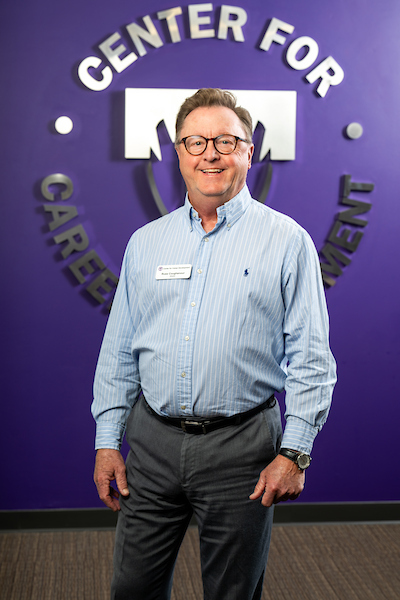Post Grad Plans: Advice from a Career Development Director
Earning your graduate degree is a huge milestone, and it deserves to be celebrated.
It is also a steppingstone for the next phase of many graduate students’ careers. Therefore, being proactive with post-graduate
plans is important, and Russ Coughenour, Tennessee Tech’s Director of the Center for
Career Development, shares tips on how students can do that.
phase of many graduate students’ careers. Therefore, being proactive with post-graduate
plans is important, and Russ Coughenour, Tennessee Tech’s Director of the Center for
Career Development, shares tips on how students can do that.
“Start keeping track of your developing skills as you progress through the master’s program and add those to your resume as appropriate,” he noted. “Best examples are things like critical thinking and problem solving, oral and written communication skills, leadership, teamwork, and technology and presentation skills.”
Developing and acknowledging these skills are vital for post-graduate plans because they shape the interview process. It is important to be able to highlight your qualities and expertise in interviews as well as utilize them to gain internship opportunities.
“Take stock of where you want to work and what you want to do,” Coughenour explained. “Start researching those opportunities.”
One of the biggest pieces of advice is to network everywhere you go – work, school and social life. Coughenour revealed that the goal is to find like-minded people, who can help along the way, and hone in on your interests.
“Informational interviews can be very valuable here,” he stated. “Know what you want, your network can’t help unless they know what you want.”
In order to discover the route to take, seek out opportunities during your academic experience. Shadowing, interning or working part-time can all be great options to pursue different career avenues.
“Being in graduate school, without any experience in a particular field, makes it tough to find that first job,” Coughenour pointed out. “Having experience is a differentiator for employers trying to sift through candidates and applications.”
More than earning experience, graduate students should research the language and dress of their desired occupation. This can communicate professionalism and dedication to potential employers.
“Students also need to focus on ‘looking’ the part as well,” acknowledged Coughenour. “This can be accomplished through research and observation but can also include things like vocabulary and phrasing during interviews.”
Establishing a career does not happen overnight; it takes time, determination, and patience.
“Too many times students want their dream job right out of college and that rarely happens,” Coughenour acknowledged. “You need to trust the academic decisions you have made and proceed confidently toward your occupational goal understanding that it may take a few years.”
When the time comes to apply for jobs, it can be nerve-wracking for students. With proper organization skills, Coughenour believes graduate students can efficiently and effectively manage both school and job applications.
"I think it’s important to set goals with how many jobs you’ll apply to in a given time period,” he explained. “Also apply for jobs if you meet 75% of their criteria, don’t think you have to be 100% qualified to apply.”
Finally, if graduate students are struggling to decipher their next step, Coughenour advises them to reach out for help.
“They want to keep their options open, so they have a hard time making decisions for fear of making the wrong one – so they stagnate,” he revealed. “Those folks need to be working with a professional counselor, someone independent, that will hold them accountable.”
Finally, Coughenour encourages students to be confident in their own choices and be willing to take the next step.
“The first destination right out of a master’s program is difficult to know with 100% accuracy,” he said. “You have to take risks.”

